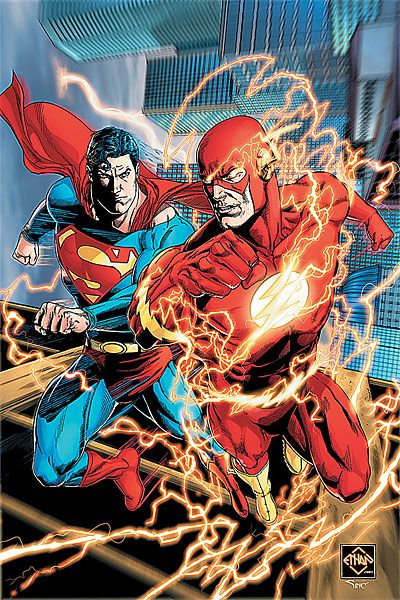In my reviews of some of the Bendis (or pseudo-Bendis) Marvel comics, I've referred to the "superhero boardroom" genre in which characters sit around cracking jokes or arguing about what to do. Geoff Johns subscribes to an opposite approach here, one I would call the "catastrophic anxiety" genre. In "Flash: Rebirth," just like in "Green Lantern: Rebirth" or "The Sinestro Corps War" or "Legion of 3 Worlds," everything that isn't a cosmic crisis is the calm before the inevitable cosmic crisis. Everything has a sense of great urgency, as if the fate of the universe hangs in the balance on each more intense page.
That approach is great, but the effectiveness of the catastrophic anxiety genre rests not in how anxious the characters are, but in how anxious the readers are. How much the readers care about the world-ending events. How much the readers care about the lives of the heroes who face these impossible challenges. If none of it matters, then it's just a bunch of ominous shadows and speed lines on the page.
That type of criticism was made against "Final Crisis," but that Morrison/Jones event comic had a haunting, nightmarish quality and imaginative scenes in every issue. So what it may have lost in emotional impact it gained in pure creative energy. But "Flash: Rebirth" #3 feels like catastrophe and character anxiety without quite enough imagination or reader empathy to make it work. A few individual pages are impressive, with the most straightlaced of all superheroes -- Barry Allen -- corrupted by the Black Flash power, the foot race between the Flash and Superman, with Barry's great line about all the other races being for charity before leaves Superman in his electrical wake, and the shocking reveal of a major villain on the final page. Those are the highlights of the issue, but they are individual moments in a story that feels out of step. The sensitive flashback moments seem too trite, the foreboding seems to forced, and the race into the belly of the speed force seems like just too much metaphysical nonsense. Instead of expanding the Flash mythology, this issue devours it like scarlet-clad Uroboros.
Van Sciver's art doesn't help to make this series rise above its story flaws. Van Sciver is a master of showing the withered speedsters, their desiccated skin tearing with ferocious velocity. But he's not as good with the noble, heroic moments. The splash page of Superman and the Flash launching into a race is a terribly composed image. Superman's tiny cranium and massive chin and jaw distract from the dead look in his eyes, as if he's showing up just out of boredom. The Flash is all shadows and solemnity, his expression as dead as Superman's. Van Sciver misses the chance to make that moment -- a panicked and bursting-with-deadly energy flash vs. the hopeful Superman -- an iconic one.
"Flash: Rebirth" #3 isn't a run-of-the-mill superhero comic, but for every great moment we get a few that don't work at all. It's certainly not a lumbering, slow comic, but its speedy pace comes at a price: we don't know what its racing toward, or why any of it really matters.

